
Iberian Journal of the History of Economic Thought
Scope & Guideline
Exploring the Roots of Economic Ideas in Iberia
Introduction
Aims and Scopes
- Historical Analysis of Economic Theories:
The journal emphasizes the historical development of economic theories, providing critical examinations of influential economic thinkers and their contributions to the field. - Interdisciplinary Approaches:
Research published in the journal often intersects with other disciplines, such as sociology, political science, and history, reflecting the multifaceted nature of economic thought. - Regional Economic Contexts:
A significant focus is placed on the economic history of the Iberian Peninsula and its influence on broader economic theories and practices, particularly during pivotal historical periods. - Critical Examination of Economic Policies:
The journal includes analyses of economic policies and their historical contexts, evaluating their impact on economic development and societal change. - Thematic Diversity in Economic Thought:
The journal encourages a wide array of topics, including critiques of mainstream economic theories, explorations of heterodox approaches, and discussions on the socio-political implications of economic ideas.
Trending and Emerging
- Impact of Political Economy on Social Issues:
A growing number of papers investigate the interplay between economic thought and social issues, such as inequality, justice, and the role of the state, highlighting the relevance of economic theories in contemporary debates. - Exploration of Heterodox Economic Theories:
There is an increasing interest in heterodox economic theories, including critiques of mainstream economics, which reflects a broader acceptance of diverse economic perspectives within the journal. - Intersections of Economics and Other Disciplines:
The journal is increasingly publishing interdisciplinary research that connects economic thought with political theory, sociology, and cultural studies, indicating a trend towards holistic analyses of economic phenomena. - Historical Contextualization of Modern Economic Issues:
Recent articles emphasize the importance of historical context in understanding modern economic issues, suggesting a trend towards using historical insights to address contemporary economic challenges. - Globalization and Economic Thought:
Research focusing on the effects of globalization on economic theories and policies is on the rise, reflecting the journal's responsiveness to current global economic dynamics.
Declining or Waning
- Classical Economic Theories:
There has been a noticeable decline in the exploration of classical economic theories, such as those of Adam Smith or David Ricardo, as newer frameworks and critiques gain traction. - Focus on Purely Quantitative Economic Analysis:
Papers that rely heavily on quantitative analysis without historical context or theoretical critique are less common, suggesting a shift towards qualitative and interdisciplinary research. - Traditional Economic History:
The journal's focus on traditional narratives of economic history is waning, with more emphasis now placed on critical and contemporary analyses of economic thought. - Neglect of Non-Western Economic Theories:
There is a decreasing number of publications addressing non-Western economic theories and perspectives, indicating a potential gap in the journal's scope that may benefit from revitalization.
Similar Journals

Journal of Belgian History-Revue Belge d Histoire Contemporaine-Belgisch Tijdschrift voor Nieuwste Geschiedenis
Fostering Insight into Belgium's Modern HistoryThe Journal of Belgian History-Revue Belge d'Histoire Contemporaine-Belgisch Tijdschrift voor Nieuwste Geschiedenis is a prominent academic publication dedicated to the exploration and analysis of contemporary Belgian history. Published by SOMA-CEGES, this journal serves as a vital resource for researchers, professionals, and students alike, providing a platform for scholarly discourse and the dissemination of innovative research in the field. Despite its historical significance, the journal faced a hiatus in its Scopus coverage from 2019, yet it retains a strong identity within the Arts and Humanities category, holding a Scopus rank of #1123 out of 1328, placing it in the 15th percentile. This underscores the opportunities for growth and impactful contributions within the journal's scope. By focusing on the intricacies of Belgian history, the journal encourages rigorous investigation and a deeper understanding of Belgium's past, making it an essential reference for anyone interested in European historical narratives.

CAMBRIDGE JOURNAL OF ECONOMICS
Navigating the Complexities of Economic ThoughtCambridge Journal of Economics, published by Oxford University Press, is a premier academic journal in the field of economic theory, policy, and applications, catering to researchers, professionals, and students alike. With a rich history dating back to 1977, this journal has established itself as a notable contributor to critical discourse in the arena of Economics and Econometrics. With an impressive Scopus ranking of #210 out of 716 in its category, placing it in the 70th percentile, the journal maintains a solid Q2 classification, reflecting its significant impact and contribution to the field. Although it operates on a subscription basis, the Cambridge Journal of Economics is accessible through a range of academic databases and libraries, ensuring that its high-quality research reaches a wide audience. The journal aims to advance the understanding and application of economic principles, making it an essential resource for anyone looking to deepen their knowledge or stay updated with the latest research trends in economics.
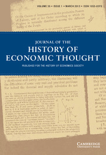
Journal of the History of Economic Thought
Advancing Scholarship in Economic HistoryThe Journal of the History of Economic Thought, published by Cambridge University Press, stands as a vital contributor to the field of economic history, providing an esteemed platform for scholarly discourse and research since its inception in 1970. With an ISSN of 1053-8372 and an E-ISSN of 1469-9656, this journal features a robust editorial agenda that examines the evolution of economic ideas through a critical and historical lens. Notably, it has achieved a commendable Q2 ranking in both Arts and Humanities and Economics, Econometrics and Finance categories, along with a Q1 ranking in History and Philosophy of Science, highlighting its academic rigor and relevance in contemporary discourse. The journal's commitment to fostering a comprehensive understanding of economic thought positions it as a critical resource for researchers, professionals, and students eager to delve into the intricate ties between economic theories and historical contexts. Although it does not offer open access, the journal continues to inspire and inform scholarship within diverse economic narratives and philosophical inquiries, thus enriching the landscape of economic history.

Oeconomia-History Methodology Philosophy
Fostering Innovative Insights Across DisciplinesOeconomia-History Methodology Philosophy, published by ASSOC OECONOMIA, is a distinguished academic journal focused on the interdisciplinary study of economics, history, methodology, and philosophy. With its ISSN 2113-5207 and E-ISSN 2269-8450, this Open Access journal has been committed to disseminating high-quality research since 2011, enabling widespread accessibility to its content. Based in Paris, France, the journal holds impressive rankings, including a Q1 quartile in History and a Q3 quartile in both Economics, Econometrics and Finance, as well as Sociology and Political Science for 2023. This diversity highlights its multifaceted approach to understanding complex societal issues. With significant visibility in leading databases, including Scopus, it appeals to researchers, professionals, and students alike, fostering robust discussions and innovative insights in their respective fields. The journal currently spans from 2018 to 2024, offering a platform for critical analyses and theoretical advancements that challenge established norms and encourage new perspectives.
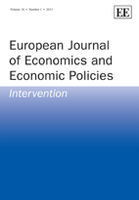
European Journal of Economics and Economic Policies-Intervention
Transforming economic understanding through high-quality scholarship.European Journal of Economics and Economic Policies-Intervention is a leading academic journal published by Edward Elgar Publishing Ltd, focusing on the intersection of economics and policy-making. Established in 2004 and set to continue through 2024, the journal is dedicated to fostering innovative research and providing a platform for interdisciplinary dialogue within the realms of economics and finance. With an H-index that reflects citation impact, it is indexed in Scopus, showcasing a respectable rank in both Economics and Econometrics, as well as Finance, categorizing it in the Q3 quartile. This journal targets a diverse readership, including researchers, professionals, and students, offering valuable insights and findings that shape economic thought and policy across Europe and beyond. While the journal operates under a subscription model, it remains committed to delivering high-quality scholarship that contributes significantly to the fields of economics and economic policies. As it continues to grow in influence, European Journal of Economics and Economic Policies-Intervention stands out as a vital resource for those seeking to understand and impact economic interventions in a rapidly evolving landscape.
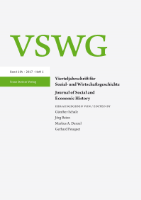
VSWG-Vierteljahrschrift fur Sozial-und Wirtschaftsgeschichte
Chronicling the Evolution of Socio-Economic LandscapesVSWG - Vierteljahrschrift für Sozial- und Wirtschaftsgeschichte is a distinguished academic journal published by Franz Steiner Verlag GmbH in Germany, focusing on the interdisciplinary fields of social and economic history. With an ISSN and E-ISSN of 0340-8728, this journal serves as a vital resource for scholars, researchers, and students interested in the complexities of socio-economic transformations across historical contexts. While it currently does not offer open access, its contributions are significant in raising critical discussions within cultural studies and economic history, as evidenced by its Q3 and Q4 rankings in various categories, including Cultural Studies and Sociology. Although the Scopus rankings reflect competitive standings, the journal continues to provide meaningful discourse and insights, supporting academic endeavors in an increasingly interconnected world.
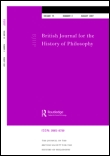
British Journal for the History of Philosophy
Advancing Critical Insights into Philosophical TraditionsThe British Journal for the History of Philosophy, published by ROUTLEDGE JOURNALS, TAYLOR & FRANCIS LTD, is a leading academic journal dedicated to the exploration and critical examination of historical philosophies and their implications. Founded in 1993 and operating through 2024, this quarterly publication holds a prestigious status, being ranked Q1 in Philosophy with a Scopus rank of 188 out of 806, placing it in the 76th percentile within the arts and humanities domain. The journal is unique in its commitment to showcasing interdisciplinary research, catering to scholars, professionals, and students interested in philosophical history's complexities and developments. Although it does not currently offer Open Access options, it remains an essential resource for contemporary debates and historical insights in philosophy, contributing to the wider academic discourse on ethical, epistemological, and metaphysical inquiries.

History of Economics Review
Exploring the Roots of Economic IdeasHistory of Economics Review, published by TAYLOR & FRANCIS LTD, is a preeminent journal dedicated to exploring the rich tapestry of economic thought and its historical evolution. With an ISSN of 1037-0196 and E-ISSN 1838-6318, this journal serves as a vital platform for scholars, researchers, and students to disseminate and engage with pivotal economic ideas, debates, and methodologies from historical perspectives. While the journal is not open access, it maintains rigorous peer-review standards, ensuring high-quality research outputs that contribute to the understanding and development of economics as a discipline. The History of Economics Review aims to bridge gaps in economic literature by providing insights into the origins and implications of current economic theories, making it an indispensable resource for those interested in the intersection of history and economics. Situated in the heart of academic publishing, the journal stands as a testament to the enduring importance of historical context in shaping economic discourse.
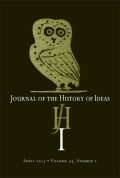
JOURNAL OF THE HISTORY OF IDEAS
Unraveling the Tapestry of Human ThoughtJournal of the History of Ideas, published by the University of Pennsylvania Press, is a leading academic journal dedicated to the interdisciplinary exploration of philosophical, cultural, and intellectual history. Since its inception in 1970, the journal has provided a vital platform for scholarly discourse, serving an essential role in the study of ideas that have shaped human thought. With an impressive Q2 ranking in Philosophy and a 75th percentile ranking in the Scopus database, this journal reflects its status as a significant contributor to the field. Although it operates under traditional access options, it remains a crucial source of empirical research and theoretical discussions in the humanities. Researchers, professionals, and students alike will find the Journal of the History of Ideas an invaluable resource for understanding the evolving narratives that inform philosophical discourse and cultural practices. The journal's articles, which are rigorously peer-reviewed and available in both print and digital formats, encompass a broad spectrum of topics, ensuring comprehensive coverage of historical thought from various perspectives up to 2024.
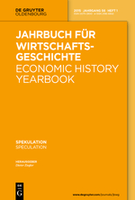
Jahrbuch Fur Wirtschaftsgeschichte
Exploring the Nexus of History and EconomicsJahrbuch Für Wirtschaftsgeschichte is a distinguished scholarly journal dedicated to the field of economic history, published by Walter De Gruyter GmbH. Since its establishment, the journal has provided an invaluable platform for researchers and scholars to publish high-quality research that explores the intricate linkages between historical events and economic developments. With its transition to Open Access since 2022, the journal has enhanced accessibility, allowing a wider audience to engage with significant contributions in the domain. Operating from Germany, the journal has a rich history covering articles from 1960 to 1996 and again from 1999 to 2024. In the 2023 rankings, it holds a Q4 quartile in Economics and Econometrics and a Q2 quartile in History, indicating its growing importance and recognition in the respective fields. With its current ranks of #949 in Arts and Humanities (History) and #686 in Economics and Econometrics, the journal serves as a vital resource for scholars looking to delve into historical economic analysis and its implications for contemporary studies.